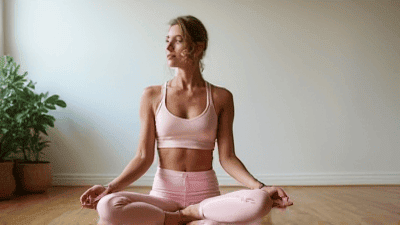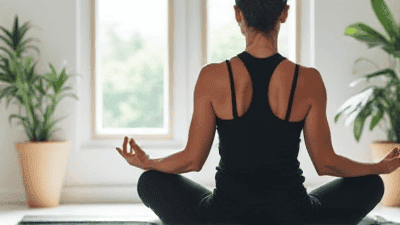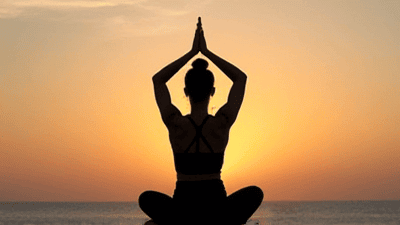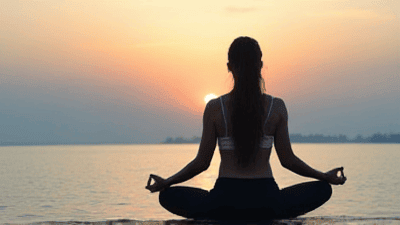
In today's fast-paced world, mental health has become a paramount concern for individuals across all walks of life. The pressures of daily living, whether they stem from work, relationships, or societal expectations, can lead to feelings of anxiety, depression, and stress. As we navigate these challenges, it is essential to look for effective strategies that promote mental well-being. Two powerful practices that have gained significant attention in recent years are yoga and mindfulness.
Mental health encompasses our emotional, psychological, and social well-being. It affects how we think, feel, act, and interact with others. Mental health is crucial at every stage of life, from childhood through adolescence and into adulthood. Good mental health allows individuals to cope with life's challenges, maintain fulfilling relationships, and make meaningful contributions to their communities.
Many individuals experience mental health challenges, with anxiety and depression being among the most prevalent. Some common indicators of poor mental health include:
Recognizing these signs and seeking help is crucial for maintaining overall well-being. Integrating practices like yoga and mindfulness can offer valuable support in managing mental health.

Yoga is a centuries-old practice that combines physical postures, breath control, and meditation to promote overall health. While many associate yoga with physical fitness, its benefits extend far beyond the mat. The practice encourages self-awareness, relaxation, and mindfulness, all of which play a vital role in maintaining mental health.
Numerous studies have shown that regular yoga practice can significantly reduce stress and anxiety levels. The combination of physical movement, breath awareness, and mindfulness helps activate the body’s relaxation response, leading to decreased levels of the stress hormone cortisol. Practicing yoga encourages individuals to tune into their bodies and become more aware of their thoughts and feelings, fostering a sense of calm.
Yoga promotes the release of neurotransmitters, such as serotonin and dopamine, that are essential for regulating mood. Improved mood and emotions derived from yoga practice can contribute to feelings of happiness and well-being. Many practitioners report experiencing a sense of euphoria or "yoga high" following a session.
Quality sleep is crucial for mental health. Yoga can enhance sleep quality by promoting relaxation and reducing insomnia. Specific yoga poses practiced before bedtime can help calm the mind and prepare the body for restful sleep.
Yoga invites individuals to connect with their bodies in a way that encourages self-acceptance and mindfulness. Practicing yoga cultivates greater body awareness, inviting a sense of empowerment and confidence. This connection can aid in improving self-esteem and self-image.
The practice of yoga inherently encourages mindfulness, as individuals learn to focus on their breath and present moment. This attentiveness promotes a greater awareness of thoughts and emotions, allowing individuals to navigate life's challenges with more equanimity.
Mindfulness is the intentional practice of focusing one's attention on the present moment while accepting thoughts, emotions, and sensations without judgment. Originally rooted in Buddhist traditions, mindfulness can be practiced through meditation, breathing exercises, and daily activities.
Mindfulness helps individuals break cycles of negative thought patterns and rumination. By learning to observe thoughts without judgment, individuals can create distance from their emotions and develop healthier coping mechanisms.
Mindfulness promotes emotional regulation by encouraging individuals to acknowledge and accept their feelings. This acceptance reduces impulsive reactions and fosters a sense of control over emotions, contributing to better mental health outcomes.
Practicing mindfulness can enhance cognitive function, leading to improvements in focus and concentration. Engaging fully in tasks without distraction can lead to greater productivity and satisfaction in daily life.
Mindfulness encourages relaxation by focusing on breathing and body sensations. Engaging in mindfulness practices can lower heart rates, reduce muscle tension, and trigger the relaxation response, promoting a sense of tranquility.
Cultivating mindfulness fosters resilience by equipping individuals with the tools to respond effectively to stressors. Mindful individuals are more likely to approach challenges with a positive and open mindset, enhancing their capacity to cope with adversity.

Incorporating yoga and mindfulness into your daily routine doesn’t have to be overwhelming. Here are some suggestions to help establish a sustainable practice:
If you’re new to yoga or mindfulness, start with as little as five to ten minutes each day. Gradually increase the duration as you become more comfortable. Even short practices can yield significant benefits.
Choose specific times during the day to practice yoga and mindfulness. Establishing a routine can help you stay committed. Morning sessions can set a positive tone for the day, while evening sessions can promote relaxation.
There are numerous online platforms, apps, and videos available for yoga and mindfulness practices. These resources can provide guided sessions that cater to different levels and preferences. Consider popular platforms like YouTube, Headspace, or Insight Timer.
Joining a local yoga class or mindfulness group allows you to connect with others and receive guidance from experienced instructors. Group settings can also foster a sense of community and accountability.
In addition to dedicated practice sessions, mindfulness can be integrated into daily activities. Consider practicing mindfulness while eating, walking, or engaging in conversation. Focus on your senses and observe your surroundings without judgment.
There are various styles of yoga, each offering unique benefits. Explore different types to find the one that resonates with you. Here are a few popular styles:
If you're interested in mindfulness meditation specifically, here are a few techniques to explore:
While yoga and mindfulness offer numerous benefits, individuals may encounter challenges when starting their practice. Here are some common obstacles and tips for overcoming them:
Busy schedules can make it challenging to set aside time for practice. Consider short sessions, as even five to ten minutes can provide relief. Use breaks throughout the day to engage in mindful breathing or a few yoga poses.
Many beginners may doubt their ability to practice yoga or mindfulness effectively. Remember that both practices are personal journeys, and there is no right or wrong way to experience them. Focus on your own growth rather than comparing yourself to others.
If you struggle to maintain focus during meditation or yoga practice, that’s completely normal. Use techniques such as counting breaths or focusing on a physical sensation, like touch or sound, to anchor your attention.
Yoga practices can be adapted for individuals of all fitness levels. If you encounter physical limitations, consider gentle styles or chair yoga. Listening to your body is crucial—modify poses to suit your comfort level.

As you cultivate a regular yoga and mindfulness practice, you may notice profound changes in your mental health. Some potential long-term impacts include:
Individuals who practice yoga and mindfulness regularly often develop greater emotional resilience. This resilience enables them to face challenges with a balanced mindset, reducing the impact of stressors on mental well-being.
A consistent practice fosters greater self-awareness, enabling individuals to recognize thought patterns, triggers, and emotional responses. This awareness can lead to healthier habits and coping strategies.
Studies indicate that individuals who practice yoga and mindfulness experience an overall sense of improvement in quality of life. Enhanced well-being often leads to increased satisfaction in relationships, work, and personal fulfillment.
As the body becomes more adept at managing stress through yoga and mindfulness, individuals may experience reduced instances of anxiety and depression. The tools learned through these practices can effectively mitigate stress in various life situations.
Research has shown that mindfulness meditation can lead to changes in brain structure associated with improved mental health outcomes. Regular practice may increase gray matter density in areas related to emotional regulation and self-awareness.
Incorporating yoga and mindfulness into your daily routine provides a pathway to improved mental health and well-being. The benefits of these practices extend beyond physical fitness, enhancing emotional resilience, reducing stress and anxiety, and fostering a deeper mind-body connection.
By starting with small, consistent practices and exploring different styles, you can enjoy the powerful effects of yoga and mindfulness. Take this opportunity to prioritize your mental health, invest in self-care, and cultivate a life filled with peace, joy, and well-being.